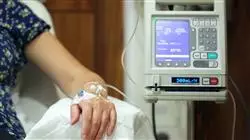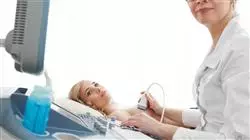University certificate
The world's largest faculty of medicine”
Why study at TECH?
This Course in Breast Cancer will generate a sense of security in the performance of your profession, which will help you to offer a quality service to your patients"

Due to the proliferation of this oncological pathology in the population and the appearance of breast cancer at increasingly younger ages, it is necessary to provide physicians with the medical knowledge, skills and abilities that will allow them to carry out their work in this area of oncological pathology, which is the leading cause of death in women.
This course in Breast Cancer gives you the opportunity to specialize in the treatment of cancer in women, in order to become an excellent professional in the treatment of diseases specific to the female gender.
The training will allow you to develop the competencies, skills and abilities that are conducive to the performance of the profession, generating greater added value to your professional performance.
This online course is developed by medical professionals who have extensive experience in this pathology, and who provide students with their knowledge, experience and practical cases that give this course the quality training it deserves.
Update your knowledge through the Breast Cancer Postgraduate Certificate"
This Postgraduate certificate in Breast Cancer the most complete and up-to-date scientific program on the market. The most important features of the program include:
- Development of more than 75 case studies presented by experts in Breast Cancer
- The graphic, schematic, and eminently practical contents with which they are created provide scientific and practical information on the disciplines that are essential for professional practice
- Latest news on breast cancer
- It contains practical exercises where the self-evaluation process can be carried out to improve learning
- Special emphasis on innovative methodologies in Breast Cancer
- All of this will be complemented by theoretical lessons, questions to the expert, debate forums on controversial topics, and individual reflection assignments
- Content that is accessible from any fixed or portable device with an Internet connection
This Professional course may be the best investment you can make in the selection of an up to date course for two reasons: in addition to bringing your knowledge in Breast Cancer up to date, you will obtain a degree a course by the leading educational institution in Spain, TECH"
The teaching staff includes education professionals, who bring their experience to this training program, as well as renowned specialists belonging to leading societies and prestigious universities.
The multimedia content developed with the latest educational technology will provide the professional with situated and contextual learning, i.e., a simulated environment that will provide immersive training program to train in real situations.
This program is designed around Problem Based Learning, whereby the professional must try to solve the different professional practice situations that arise during the course. For this purpose, the professional will be assisted by an innovative interactive video system developed by renowned experts in the field of of Breast Cancer and with great medical experience.
Increase your confidence in decision making by updating your knowledge through this course"

Take the opportunity to learn about the latest advances in Breast Cancer, and improve the training of your students"
Why study at TECH?
TECH is the world’s largest online university. With an impressive catalog of more than 14,000 university programs available in 11 languages, it is positioned as a leader in employability, with a 99% job placement rate. In addition, it relies on an enormous faculty of more than 6,000 professors of the highest international renown.

Study at the world's largest online university and guarantee your professional success. The future starts at TECH”
The world’s best online university according to FORBES
The prestigious Forbes magazine, specialized in business and finance, has highlighted TECH as “the world's best online university” This is what they have recently stated in an article in their digital edition in which they echo the success story of this institution, “thanks to the academic offer it provides, the selection of its teaching staff, and an innovative learning method aimed at educating the professionals of the future”
A revolutionary study method, a cutting-edge faculty and a practical focus: the key to TECH's success.
The most complete study plans on the university scene
TECH offers the most complete study plans on the university scene, with syllabuses that cover fundamental concepts and, at the same time, the main scientific advances in their specific scientific areas. In addition, these programs are continuously being updated to guarantee students the academic vanguard and the most in-demand professional skills. In this way, the university's qualifications provide its graduates with a significant advantage to propel their careers to success.
TECH offers the most comprehensive and intensive study plans on the current university scene.
A world-class teaching staff
TECH's teaching staff is made up of more than 6,000 professors with the highest international recognition. Professors, researchers and top executives of multinational companies, including Isaiah Covington, performance coach of the Boston Celtics; Magda Romanska, principal investigator at Harvard MetaLAB; Ignacio Wistumba, chairman of the department of translational molecular pathology at MD Anderson Cancer Center; and D.W. Pine, creative director of TIME magazine, among others.
Internationally renowned experts, specialized in different branches of Health, Technology, Communication and Business, form part of the TECH faculty.
A unique learning method
TECH is the first university to use Relearning in all its programs. It is the best online learning methodology, accredited with international teaching quality certifications, provided by prestigious educational agencies. In addition, this disruptive educational model is complemented with the “Case Method”, thereby setting up a unique online teaching strategy. Innovative teaching resources are also implemented, including detailed videos, infographics and interactive summaries.
TECH combines Relearning and the Case Method in all its university programs to guarantee excellent theoretical and practical learning, studying whenever and wherever you want.
The world's largest online university
TECH is the world’s largest online university. We are the largest educational institution, with the best and widest online educational catalog, one hundred percent online and covering the vast majority of areas of knowledge. We offer a large selection of our own degrees and accredited online undergraduate and postgraduate degrees. In total, more than 14,000 university degrees, in eleven different languages, make us the largest educational largest in the world.
TECH has the world's most extensive catalog of academic and official programs, available in more than 11 languages.
Google Premier Partner
The American technology giant has awarded TECH the Google Google Premier Partner badge. This award, which is only available to 3% of the world's companies, highlights the efficient, flexible and tailored experience that this university provides to students. The recognition as a Google Premier Partner not only accredits the maximum rigor, performance and investment in TECH's digital infrastructures, but also places this university as one of the world's leading technology companies.
Google has positioned TECH in the top 3% of the world's most important technology companies by awarding it its Google Premier Partner badge.
The official online university of the NBA
TECH is the official online university of the NBA. Thanks to our agreement with the biggest league in basketball, we offer our students exclusive university programs, as well as a wide variety of educational resources focused on the business of the league and other areas of the sports industry. Each program is made up of a uniquely designed syllabus and features exceptional guest hosts: professionals with a distinguished sports background who will offer their expertise on the most relevant topics.
TECH has been selected by the NBA, the world's top basketball league, as its official online university.
The top-rated university by its students
Students have positioned TECH as the world's top-rated university on the main review websites, with a highest rating of 4.9 out of 5, obtained from more than 1,000 reviews. These results consolidate TECH as the benchmark university institution at an international level, reflecting the excellence and positive impact of its educational model.” reflecting the excellence and positive impact of its educational model.”
TECH is the world’s top-rated university by its students.
Leaders in employability
TECH has managed to become the leading university in employability. 99% of its students obtain jobs in the academic field they have studied, within one year of completing any of the university's programs. A similar number achieve immediate career enhancement. All this thanks to a study methodology that bases its effectiveness on the acquisition of practical skills, which are absolutely necessary for professional development.
99% of TECH graduates find a job within a year of completing their studies.
Postgraduate Certificate in Breast Cancer
According to figures presented by the World Health Organization, breast cancer is the most common type of cancer nowadays, registering about 2.2 million cases in the last year. Due to this situation, there is a growing interest, on the part of governments and entities around the world, in strengthening and improving their care services for this type of pathology, one of the main strategies for this being the growing recruitment of professionals specialized in the field. Understanding the need for academic updating that accompanies the interest of physicians for an optimal and adequate access to this important occupational field, in TECH Global University we have prepared a Postgraduate Certificate in Breast Cancer. This postgraduate course will delve into the management of hormone therapy, excision and other treatments used in the management of precursor lesions of this cancer. Likewise, it will delve into the modernization of the following concepts: the aspects to be taken into account in the processes of anatomopathological assessment of the breast after a neoadjuvant therapy procedure and the identification of the most recent advances regarding the study of this hereditary cancer.
Study an online Postgraduate Certificate on breast cancer
Due to its high rate of affectation, this type of cancer stands out as one of the oncological pathologies of greatest medical interest at present; being one of the fields that poses the most challenges, difficulties and problems, both diagnostic and therapeutic, to its specialized professionals. In our program you will approach the identification of the new tools developed for the adequate monitoring and follow-up of patients affected by this pathological condition. Likewise, the following topics will be updated: the particularities to be considered in the development of a core needle biopsy process in the diagnosis of breast cancer cases and the identification of new therapeutic targets to be taken into account in modern treatments for this cancer.







